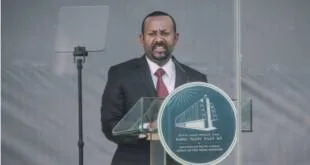Foreign investors including Dangote Cement had property damaged as protestor grievances birthed country’s most serious political crisis in a decade.

WHEN Ethiopian farmer Mulugeta Mezemir ceded his land three years ago to property developers on the fringes of the expanding capital, Addis Ababa, he felt he had no choice.
A gated community with white picket fences and mock Roman pillars built by Country Club Developers now occupies the fields he tilled in Legetafo, Oromia region, after the 60-year-old said local government officials convinced him to accept an offer or face expropriation. He took the cash and vacated the land, which in Ethiopia is all state-owned.
“We were sad, but we thought at the time that they were going to take the land for free,” said Mulugeta, a father of 12, while feeding hay to cattle a few meters from foundations for the next phase of housing. “We thought it was better to take whatever they were paying.”
As Ethiopia, which the International Monetary Fund estimates saw 8.7% economic growth in the last fiscal year, undergoes a construction boom, complaints over evictions and unfair compensation have fomented the country’s most serious domestic political crisis in a decade.
‘Crooked officials’
In protests by the largest ethnic group, the Oromo, that began in November, security forces allegedly shot dead as many as 266 demonstrators, according to the Kenya-based Ethiopian Human Rights Project. The government says many people died, including security officers, without giving a toll. Foreign investors including Dangote Cement Plc had property damaged.
Ethiopian Communication Minister Getachew Reda said protesters were in part angry at “some crooked officials” who have been “lining their pockets by manipulating” land deals around the capital. Property developers CCD followed legal procedures, paid standard rates of compensation and employed many members of farmers’ families, according to Tedros Messele, a member of the company’s management team.

Cases such as Mulugeta’s have been a growing trend on the outskirts of the capital over the past two decades, said Nemera Mamo, an economist at Sussex University in England. No recent, independent studies have been conducted into how many people have been affected.
Fastest-growing
“The booming construction industry has contributed to Addis Ababa’s rapid expansion that’s dispossessed many poor farmers and turned them into beggars and daily labourers,” Nemera said. “The Oromo protest movement opposes the mass eviction of poor farmers.”
The government shelved a plan for the integrated development of Addis Ababa and surrounding areas of Oromia in January after protesters rejected it.
Ethiopia’s state-heavy model seeks to industrialise the impoverished nation within a decade by improving infrastructure and combining investment with cheap labor, land and water to produce higher-value goods. Projects for what the IMF calls African’s fastest-growing economy include the continent’s largest hydropower dam, railways and the building of 700,000 low-cost apartments by 2020.
Construction accounted for more than half of all industry in the fiscal year that ended in July after it grew an annual 37%, according to National Bank of Ethiopia data. Industry comprised 15% of output.
Off the pace
Investors such as Diageo Plc, the world’s largest liquor maker, and Unilever Plc are tapping into the expansion by building Ethiopian facilities. Citizens of Africa’s second-most populous nation are using money earned there or abroad to build residences, malls and offices.
The ruling party hasn’t kept pace with the boom by improving governance and the ability of domestic manufacturers to supply the industry, said Tsedeke Yihune, who owns Flintstone Engineering, an Ethiopian contractor that’s built upmarket housing and African Union offices.
“Construction has not been used as it was supposed to, as a means of building domestic capacity, building good governance, as well as delivering the government’s development agenda,” Tsedeke said in an interview in the capital.
More than 70% of construction materials are imported, including cables, steel, ceramics, locks, furniture and electrical fittings, Tsedeke said. Ethiopia’s trade deficit increased by $3 billion to $14.5 billion last fiscal year.
‘Good governance’
Addis Ababa-based Orchid Business Group is another recipient of government capital spending, which the IMF says could double to almost $15 billion a year by 2020. Orchid’s projects include one with Italy’s Salini Impregilo SpA building the Grand Ethiopian Renaissance Dam, said Hailealem Worku, the construction and engineering head.
Cement plants built by companies including Dangote have made Ethiopia self-sufficient in the material, while manufacturing incentives means glass, paint and steel factories will play a bigger role soon, Hailealem said.
The government wants to improve regulations and change attitudes so contractors boost their skills and ethics, Construction Minister Ambachew Mekonnen said in an interview. “The construction industry suffers from a lack of good governance,” he said.
In Legetafo, Mulugeta was paid 17 birr ($0.80) a square meter in compensation. Meanwhile, people were bidding as much as 355,555 birr per square meter to rent land in Addis Ababa last year. Mulugeta used the 200,000 birr he received for the plot for expenses including renting more farmland. Two of his children now work as CCD cleaners, earning 40 birr a day.
“We are getting deeper into poverty,” he said.




